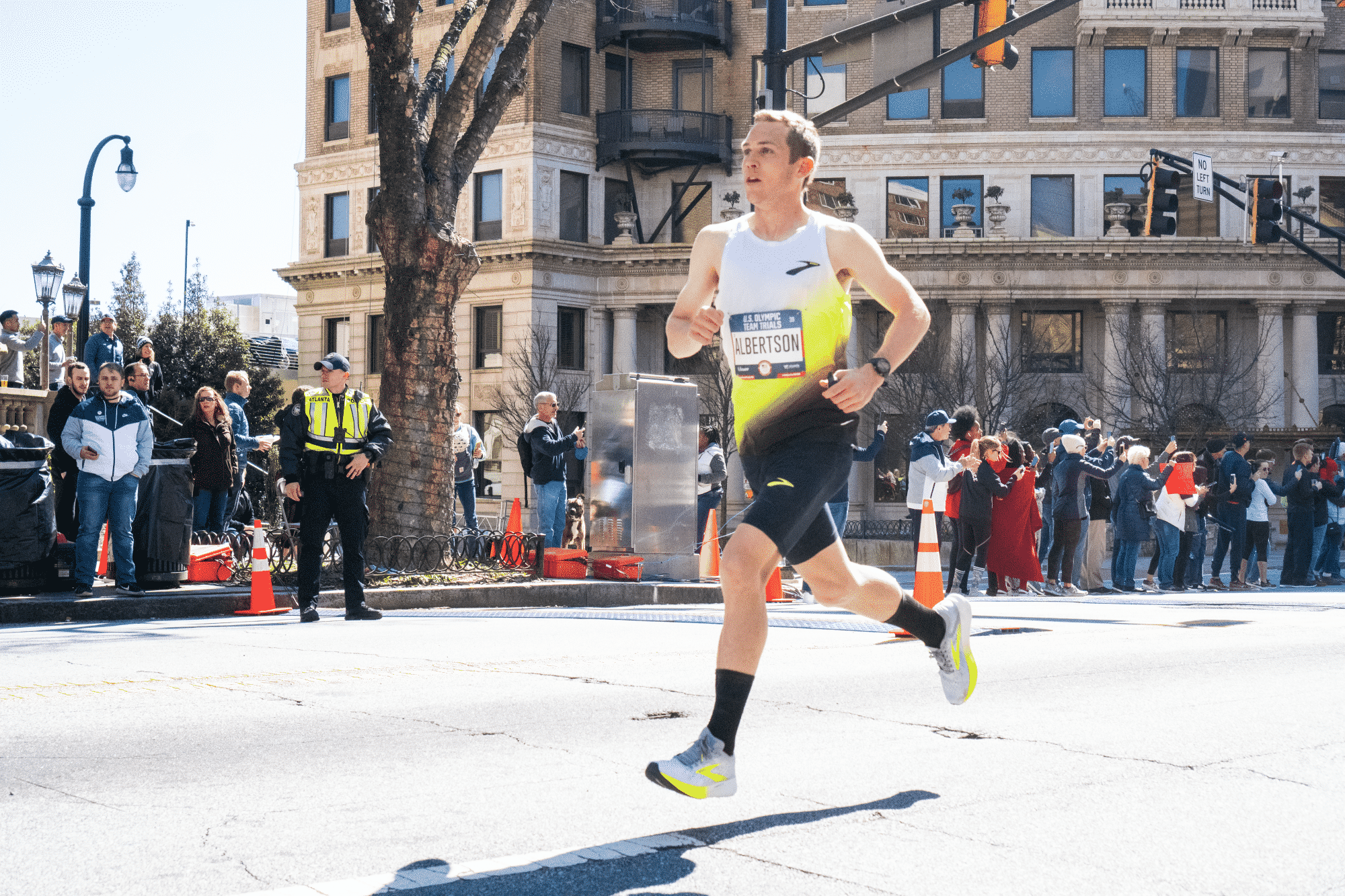Here’s a few of 27-year-old CJ (Clayton Jordan) Albertson’s runs the past few weeks:
Nov. 1st: 50.4K treadmill run in 2:42. That’s 31.5 miles @ 5:11 pace with a marathon split of about 2:14:45 en route.
Nov. 8th: 50K on an official track in 2:42:30. That’s a new world record.
Nov. 15th: 37 mile treadmill run at 5:56 pace.
Nov. 22nd: 26.22 mile treadmill run in 2:09:58, plus an additional mile in 4:48.

It’s hard to imagine that any athlete in The Marathon Project race on Dec. 20 will have done more long-hard runs in November. The Marathon Project is a special “closed” race in Chandler, Ariz., for elite runners, most of whom haven’t had a chance to enter a marathon since the U.S. Olympic Trials in Atlanta in late February (pre-Covid). Two entrants, Scott Fauble and Cam Levins, have marathon bests in the low to mid-2:09s.
Albertson, to date, has been at least two minutes slower than that, with a PR of 2:11:49 from Atlanta. Based on his recent exploits, however, he has to be considered a co-favorite. And he says he’s ready to go out with the pacers, who are expected to maintain 2:09 tempo for 25- to 30K. “When they stop, I’ll read the field, assess how I feel, and do what I need to do to win.”
Despite wins in the 2018 and 2019 Two Cities Marathons, with a best there of 2:14:51, Albertson received little attention prior to the Olympic Trials. He ranked 35th by time in the field. That didn’t stop him from finishing 7th on a killer course that slowed many runners by several minutes vs their previous times.
Now a teacher and cross-country coach at Clovis Community College in Fresno, Cal., Albertson considers the Marathon Trials his Best Race so far. After a rather nondescript college career at Arizona State (with PRs of 8:45 in the steeplechase, and 13:50 in the 5000), he was particularly jazzed about his finish position in Atlanta. “Placing seventh in the nation was a feat I had never come close to before,” he notes.
How has Albertson improved so much? He does astounding long runs, obviously. These are based on his “Running is easy” philosophy, which he hopes will propel him even farther and faster.

Training buildup to his Best Race:
In his last two months of training before the Olympic Marathon Trials, Albertson ran anywhere from 104 miles per week to 141 miles. He did a long run every weekend, covering distances from 23 miles to 33 miles. Three of these runs were 30 miles or longer. Not only that, but he ran them all at impressive paces — anywhere from 5:09 per mile to 6:06 (33 miles).
Peaking:
Albertson considers his long runs the most specific part of his marathon preparation, so that’s what he concentrates on. Three weeks before the Atlanta Trials, he completed a 27-mile long run at an average pace of 5:09 per mile. “I started with the first mile in 4:46 in case the Trials race went out fast,” he says. “And I finished with a last mile in 4:43 to practice finishing fast.”
Taper:
Albertson doesn’t like a big taper. He finds that a seven- to eight-day cutback works fine. “Before Atlanta, I ran 104 miles two weeks out, with only 10 miles for my weekend long run,” he says. “So I didn’t really do any less the other six days.” During marathon week, he ran about 9 miles a day for five days before the Saturday morning marathon.
Race strategy:
Of course Albertson would have liked to finish on the podium and gain an Olympic team berth, but his highest realistic goal was a place in the top 10, which he attained. “I planned to run with the pack, attack the downhills, and finish strong,” he says. “I don’t think much about ‘focusing.’ Instead I try to stay relaxed and let my mind go blank.”
Key race moment, and how he responded:
At about 14 miles, Galen Rupp surged, and the real racing began. Albertson felt that he couldn’t match the frontrunners at that point, so he settled into the second pack.
That group blew up at 20 miles. “I was pretty tired, and in about 18th place,” Albertson remembers. “But I reminded myself to ‘Run easy,’ and eventually I started passing people all the way to the finish.”
How his recent races and workouts have changed him:
“I have the confidence that I can develop into one of the best marathoners in the U.S., if not the best. But I like to train as if I’m just a normal guy with a running hobby. I don’t have to take things too seriously. I can have fun with my training. I can also do some things in training that might seem a little odd, but which I think are helpful for me.”

Albertson’s advice on running your own Best Race:
“Don’t overthink things,” he begins. “There’s no “perfect” way to train. You just want to challenge your body with different stimuli, and then give it space to recover and adapt. Most of the time, I don’t even plan workouts. I just make them up on the spot, based on how I’m feeling.
“My only ‘constant’ is maintaining the mentality that ‘running is easy.’ I do this on every run. Yes, I do some fairly ridiculous workouts. If I start to struggle, I just remind myself, ‘Wait, running isn’t hard.’ Then I find a way to relax without slowing down.”
Albertson used to be intimidated by the kind of efforts he now completes regularly. He’d be scared by the inevitable hurt that he knew was coming.
“Now I know they’re going to be easy. They’re just a chance to see how fast I can go. This way of running is a lot of fun, so I highly recommend it.
“It does take practice. The first time you tell yourself ‘Running is easy,’ your body produces agonizing pain to try to prove you wrong. But over time, it starts to agree with you.”


